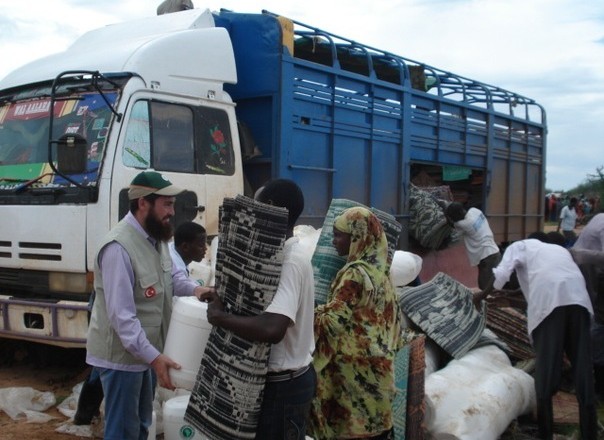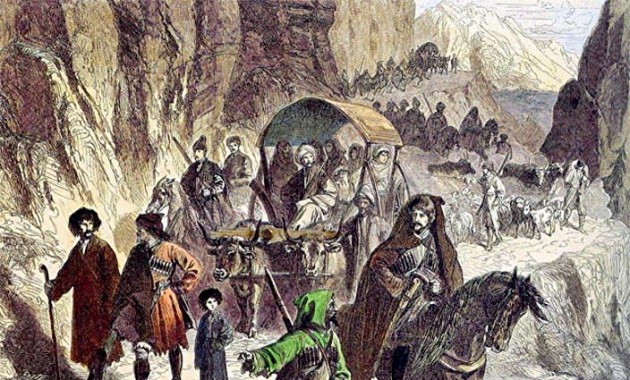Mursi's visit to Russia. Obstacles and consequences
The first meeting of the new Egyptian President Muhammad Mursi with the head of Russia Vladimir Putin, held in late April, was ambiguously estimated by Russian analysts and Muslims. Lets's recall that on April 19, Egyptian President Muhammad Mursi made his first visit to Russia.
In the city of Sochi on the Black Sea, he held talks with President Vladimir Putin. A number of important agreements in the economic and political spheres were achived. At the end of Putin invited Egyptian counterpart for gas summit in Moscow in July, and the Mursi invited the head of the Russian state in Egypt at any time.
Three sensible factors
The contradictory of estimating this visit is related to several factors, due to which the visit of the Egyptian president in Russia in general could not have taken place. The first factor is related to the fact that the Association of the Muslim Brotherhood, which is represented by Mursi, stands outside the law in Russia.
Thus, its activities on the territory of Russia was prohibited by the decision of the Supreme Court of the Russian Federation of February 14, 2003. This decision was accepted in Russia at the height of the military campaign in Chechnya, when the Russian authorities have begun to accuse the movement of the Muslim Brotherhood in supporting the Chechen rebels.
Russian analysts, orientalists and Muslim activists have written many times, referring to the authorities, about the absurdity of this decision. They pointed out that the Russian authorities in the future will have to work with the movement of the Muslim Brotherhood and contact with its leaders. They noted the fact that the representatives of Muslim Brotherhood are quite legitimate part of the political and parliamentary systems in many Arab countries.
Largely because of such undue position in relation to the Muslim Brotherhood, the Russian authorities failed to properly navigate the rising tide of Arab revolutions. However, the arguments of the orientalists and Muslims have not been heard by the authorities. This ridiculous incident was not eliminated. And in the end it turned out that the Russian president met not only with the president of Egypt but also with a representative of the organization banned in Russia.
The second fact is related to the role of the new post-revolutionary Egypt in establishing the supply of natural gas to Europe. Thus, according to Russian Energy Minister Alexander Novak, Egypt addressed to Russian giant - gas-company "Gazprom" to assist in the organization of the swap gas supplies to Europe. Moreover, the close ally of the new Egypt - Qatar is also interested in its gas supplies to Europe.
For Russia, this option faces big losses because Russia wants to remain uncontested supplier of gas to Europe. According to Russian Energy Minister Alexander Novak, the Russian gas giant Gazprom is interested in the fact that Europe would buy not the Arab gas, but only Russian.
He proposed an interesting scheme: "The gas, which the Egyptians had previously contracted to send to Europe, they are ready to use it at home for domestic consumption, and we could provide Europe with gas at the expense of an additional supply of" Gazprom".
In addition, to reduce the need of Egypt for some alternative sources of income through the organization of its gas supplies to Europe, Moscow even offered to help Cairo with money. The amount that Moscow is ready to lend Cairo is kept in secret, but reporters found out that the deal is about $ 3 billion.
The third fact is the conflict in Syria, at which Russia and Egypt have completely different views. Moscow as known, causing frustration in the Arab world, continues to stubbornly maintain the regime of Bashar al-Assad. While the Arab countries, especially the post-revolutionary, such as Egypt and Libya, support the opposition.
Despite the rigidity of the debate on the Syrian conflict between Moscow and the Arab world, Mursi decided not to dwell on this issue the attention during his meeting with Putin. That even the Russian president said: "Russia and Egypt are unanimous on the need of political and legal solutions Syrian crisis without outside interference. We support an early ceasefire and start negotiations between the both sides of conflict".
Rights of Russian Muslims
Questions mentioned above were factors and problems lying on the surface. In all these matters Mursi and Putin have shown sufficient flexibility. That's why their negotiation, by the estimates of the majority of Russian experts, could be considered as successful.
So, after a conversation with Muhammad Mursi, Vladimir Putin said that the talks were very detailed and substantive. And it was not an exaggeration. Conversation continued about 3 hours 40 minutes. It was certainly an unprecedented long for such meetings - says a leading Russian newspaper Kommersant.
It is worth to mention that all these three factors - the prohibition in Russia the Muslim Brotherhood organization, the fear of Moscow to gas competition from Cairo and the Syrian conflict - are issues that are being discussed by major Russian analysts and politicians.
However, there are still a number of problems that are not supported in the Russian political and information field by leading analysts. And these problems are directly related to Russian Muslims. They are connected with the growing pressure of the state bureaucracy on Muslim activists in Russia.
 |
| Fanzil Akhmetshin distributes humanitarian rice Somali refugees in the camp of Daadab |
Obvious examples of this growing pressure are the cases of banning of a number of Islamic books in Russia, including the works of al-Ghazali, Ibn Hisham's Sirah, al-Mubarakfuri's Sirah, collections of Hadith of Imam an-Nawawi "Gardens of the righteous," etc. In the same line is a ban on the wearing of Hijab by schoolgirls in one of the Russian regions - Stavropol.
Among these problems, it is also noteworthy the obstruction by the authorities of major Russian cities such as Moscow, St. Petersburg, Stavropol, and others to build more mosques for the growing Muslim community. For example, a millionth Muslim community in Moscow has only 4 mosques. At Juma and holidays prayers people are forced to pray in the streets in the rain and snow.
There is a growing pressure on Russian Muslims from law enforcement and the judicial systems. Time and time again in Russia high-profile lawsuits triggered against Muslim activists.
Among those wrongfully convicted, in the opinion of Russian Muslims, should be called an activist from Bashkiria Fanzil Akhmetshin, who organized the delivery of humanitarian aid to Kenya and Somalia, and who was convicted by a court to 4.5 years in prison. In the same row is the head of an Islamic publishing house "Sad" Aydar Khabibulin who was sentenced to 4 years imprisonment. And the list goes on.
Russian Muslims because of number of reasons in such conditions do not demonstrate sufficient activity to defend their rights and the protection from bureaucratic pressure. Much of the Russian believers expect from the leaders of Muslim countries - Saudi Arabia, Turkey, Egypt, that they could protect the rights of Muslims in Russia through their direct contacts with the Russian leadership.
However, the problem of protecting the rights and freedoms of Russian Muslims rarely comes up during the bilateral meetings between the heads of Muslim states with Russian leaders. And so it happened during a meeting of Muhammad Mursi with Vladimir Putin. The reasons for this will be discussed below.
 |
| Circassian people went to hajj. |
Circassian issue
Further, the meeting Mursi and Putin exposed another issue, which as the problem of infringement of the rights of Muslims, pending raise in the Russian media. This question is related to the place of meeting of the heads of Egypt and Russia, namely the city of Sochi.
The fact is that the city of Sochi on the Black Sea is not only the capital of the future Winter Olympic Games in 2014. But it is also very symbolic and tragic place in the history of Muslims in the North Caucasus.
The problem is that in the area of Sochi and adjacent to the Black Sea Caucasian lands for centuries and up to the mid-19th century, lived one of the largest Muslim peoples of the Caucasus - Circassians, also known as the Adygs.
The process of spreading Islam among the Circassians was associated with the efforts of the Ottoman Sultanate. This Muslim empire for a long time, since the end of XV to the XIX century, sought to turn the Circassians in its orbit of influence and strengthen Islam in their lands. Circassian Mamluks some time even ruled Egypt and Syria.
However, in the 19th century after coming to Caucasus of the Russian Empire Circassians were involved into a bloody war to defend their land. After decades of hard-fought war, the Circassians were defeated by Russian troops. A huge number of Circassians were killed, most of the survivors driven out to the Middle East as Muhajirs, and their lands were given to the Cossacks - Russian army military class.
Sochi, just located on the site of the Black Sea, where the bloodiest events of the Circassian tragedy have taken place. Multi-million Circassian diaspora in the Arab world, Europe and North America is seeking from the Russian authorities to recognize the mass deaths of the Circassians in the 19th century as genocide.
Circassians hold rallies and protests across the world, demanding cancellation of the Olympic Games in Sochi in 2014, appealing to the fact that the Olympic Games can not be performed on the land of genocide. This issue is very irritating to Moscow, and Kremlin does everything to ensure that this issue will not be put by anyone on the agenda.
 |
| Circassian rally in Istanbul |
"We believe that performing the Olympic games in the land where the most severe genocide was committed, and are still not recognized as a crime, is blasphemous and contrary to the humanitarian principles and principles of Olympic Committee, "- said a time ago Murat Berzegov - one of the leaders of the Circassian movement.
One of the leading Russian experts in the Circassian issue Naima Neflyasheva notes that with approaching to the date of Olympic Games in Sochi, all existing problems can "inevitably translate into protests of Circassian diaspora." "Of course, they will not affected on the holding of the Sochi Olympics, but reputational risks for Russia only increase" - emphasizes the expert.
That is why a group of the Caucasian Muslims was somewhat puzzled by Egyptian President's visit to Sochi and the fact that he did not raise the Circassian issue with Putin. This claim to Egyptian leader looked a little naive from their part.
As the Muslim analyst Abdullah Mukhametov said, Mursi now will not pay much attention to the factor of Russian Muslims, their problems and prospects. Moreover, "He will not, of course, raise the question of the bannig in Russia the movement of Muslim Brotherhood, actually ruling in Egypt" - said the analyst.
Thus, the Turkish leader Recep Tayyip Erdogan, with whom Putin, by the way, have developed quite a good personal relationship, does not raise, at least in public, the issue of banning in Russia the works of Turkish theologian Said Nursi. Everyone pretends that all these issues are just insignificant misunderstandings are not for the level of Heads of State "- added Mukhametov, noting that "Russia also bypasses the theme of Copts in Egypt or the Kurds in Turkey, as a percentage roughly equal to the Muslims of Russia".
*****
Dr. Ruslan Kurbanov, PhD in Political Science, is a senior research fellow of the Institute for Oriental Studies of Russian Academy of Sciences and the director of Al-Tair Foundation.